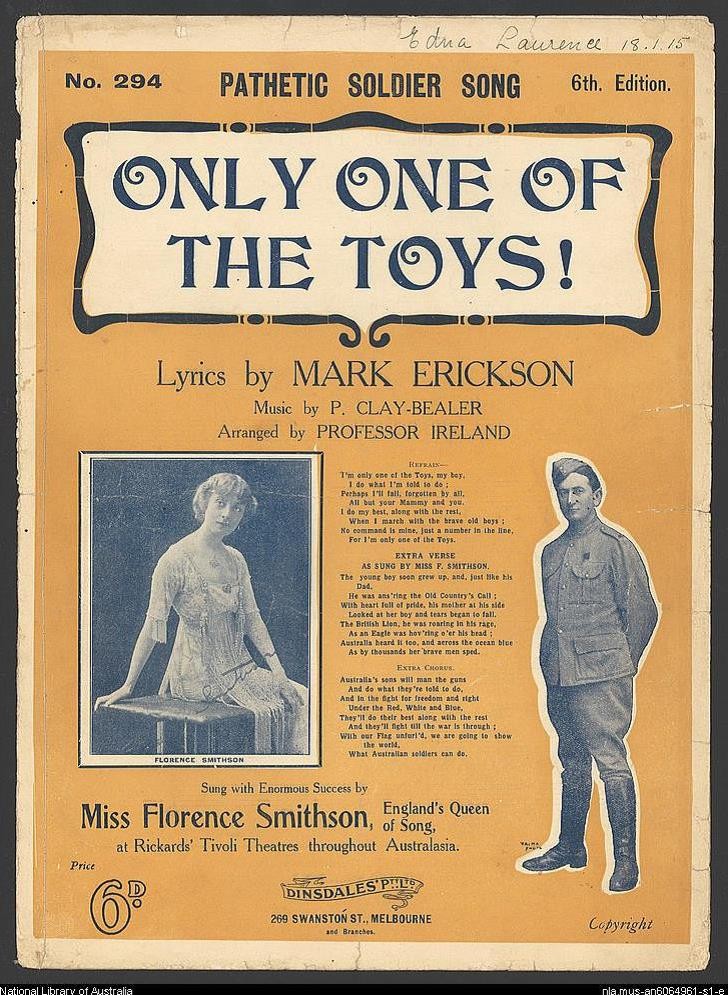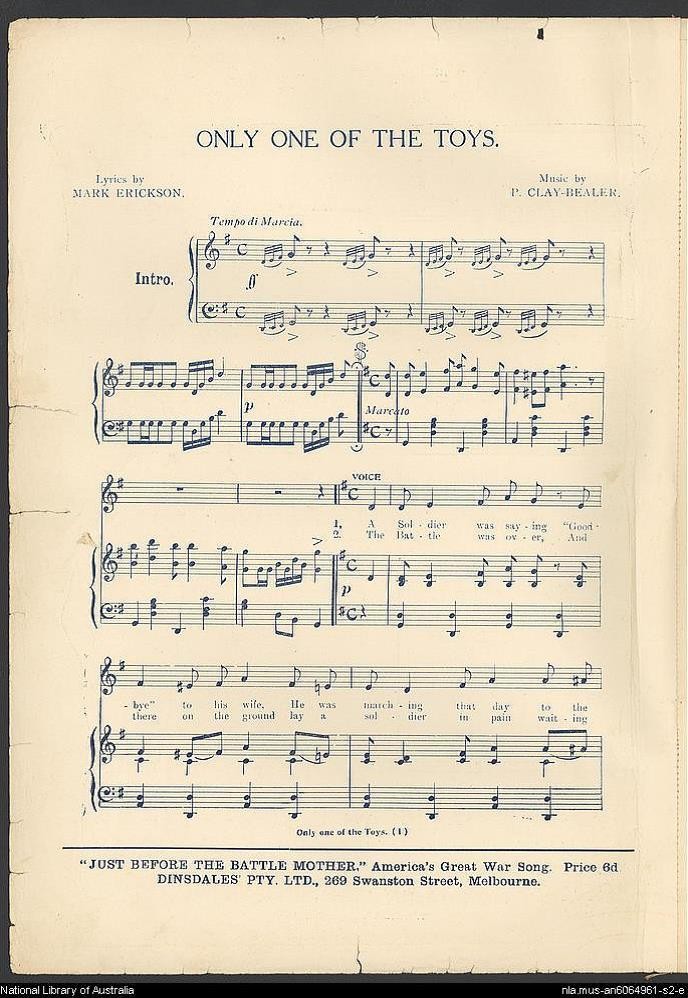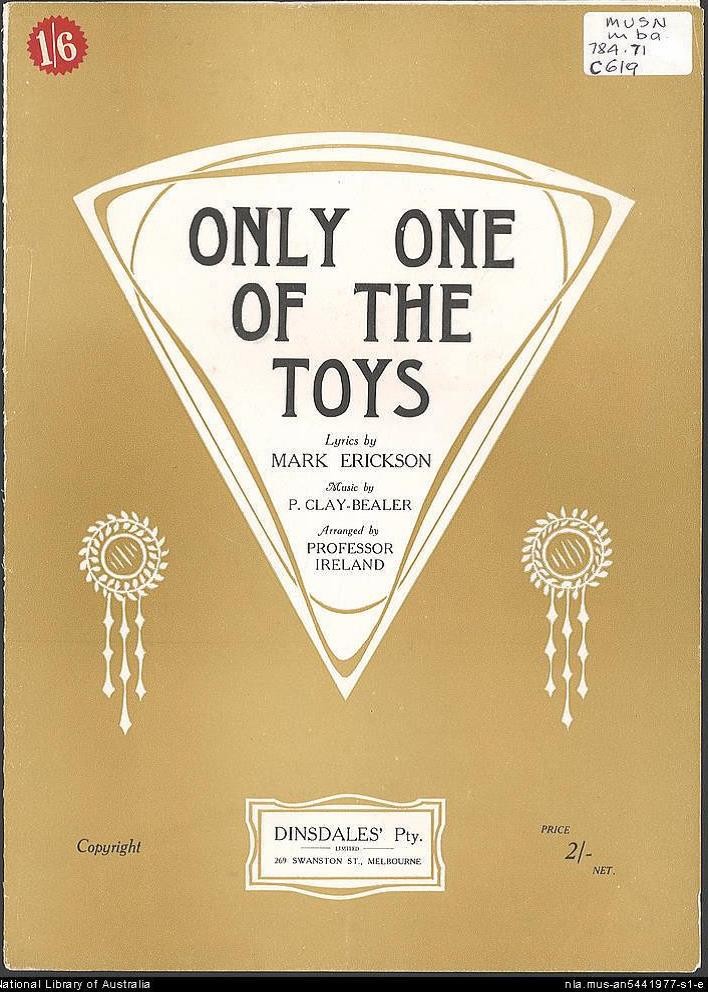Guest blogger: Sandy Bickerton, University of Queensland
Honesty is the best policy, but sometimes honesty is also brutal. Only One of the Toys by Mark Erickson and P. Clay-Bealer is an example of how war caused people to be brutally honest when they might otherwise be playfully fictitious. Another one of Dinsdale’s productions, the song tells the story of a husband and father about to march off to war, not to return. His young son plays with toy soldiers on the floor, fantasising about his father’s role in the battle. When the boy asks if his father will likewise be able to give orders and win the battle, the frank reply of his father is “I’m only one of the toys.”

The description on the cover of a “pathetic soldier song” matches the resigned and defeated attitude conveyed by the lyrics. The miserable story worsens as the man is killed in battle, and instructs his comrade to report to his family the story of his death. Not some heroic tale, but the story of a “number in the line” who will only be remembered by his son and his wife.
The song was very popular, and it isn’t hard to see why. The brutal honesty of the situation was that not everyone’s husband and father returned a war hero, or was posthumously awarded the Victoria Cross. The situation related to the average Australian and spoke to their plight. This manuscript, on which the original owner inscribed the date 18/1/1915, is the 6th edition of the song, and had been successfully performed by English singer, Miss Florence Smithson, as a part of her touring of Australasia at Rickard’s Tivoli theatres. Her photo is depicted on the cover along with a soldier, likely a private, who appears to be wearing a Citizen Forces uniform. To have gained such success only a year into the war is quite remarkable. People were paying six dollars for this version, while almost all other songs were two dollars. The additional four dollars included an extra verse and chorus as sung by Miss Smithson.

The extra lyrics extrapolate the story of the young man who then grew up to fight for his country like his father. But unlike the original verses, the additional chorus then firmly places his story as a valiant contribution to the greater cause, the “British Lion”, the “fight for freedom and right”, “to show the world what Australian soldiers can do.” The extended version then balances the individual story with the flavours of patriotism and duty. These seem to have connected with a large number of Australians and ensured the song’s success.
Although this story describes the resignation of a soldier to his fate, Australians did not resign everything during the war. Some things required compromise to continue, but Australians found a way to keep their lives going. Touring artists continued during this time. They were usually either in the form of a revue, or else they were performers of chamber music. English Pianist, L. Borwick, continued his tour of Australia, performing in Adelaide with the Adelaide Chamber Music Society in August 1914. He performed in Melbourne on Thursday August 14th, playing a concert mainly featuring the Classical and Baroque music of Brahms.
The production of pianos was also preserved during the war. An article in the Warwick Examiner and Times (QLD) on Monday, January 18th, 1915 ensures the readers that Australia had made arrangements with England and America for the supply of parts for which they had previously relied on Germany. The demand for the pianoforte did not decrease during the war period, as is shown by the optimism of this article. It argues that the war will even be a positive influence on Australia’s piano manufacturing ability. “Australia will embark more extensively on the manufacture of pianos and other musical instruments…there ought to be a favourable field for the competition of the Australian manufacturer.” If there was a boost in popularity of Australian made instruments, it would only last until the manufacturing boom in Asia after World War II.

Australians were evidently resilient in their appreciation of music during the war. Only One of the Toys featured in a welcome-home concert for two returned soldiers in October 1915. Privates C. W. Block and Les Furrand returned from fighting in Gallipoli. Block had lost one eye when a bullet ricocheted off his rifle spraying shards into his face. The two were both from the (then) small town of Numurkah in Victoria. The article features the speech of a certain Rev. Williamson, welcoming them home as “Heroes of Gallipoli!” The song expressed the sadness of their loss, but also the valour of their contribution and was a fitting addition to the program.
In typical style, the song is a march. The melody moves continually, which makes the listener feel somewhat uneasy about the freedom with which the father expresses these truths to his son. There is mimicry of trumpet fanfare in the piano score, tying in with the military mood. The chording maintains a bright colour for most of the song, which softens the otherwise blunt lyrics. The chord progression and the alberti bass technique in the left hand lend themselves to the story-telling style of the lyrics.
Vocals: Alexander Bickerton
Piano: Callum Gibson
Production: Callum Gibson
Lyrics:
A soldier was saying “Goodbye” to his wife,
He was marching that day to the war
His little son played with a gallant toy brigade
Of brightly painted soldiers on the floor
The boy looked up from his scene of mimic strife
And he said, “Daddy when to war you go,
Will you have a reg’ment too, will you drill them like I do?”
But his father answered “No,”
Chorus
I’m only one of the Toys, my boy,
I do what I’m told to do
Perhaps I’ll fall, forgotten by all,
All but your mammy and you
I do my best along with the rest
When I march with the Brave Old Boys,
No command is mine, just a number in the line;
For I’m only one of the toys
The battle was over and there on the ground
Lay a soldier in pain waiting death
His comrade bent his head just to hear the words he said
That came so slowly with his dying breath,
“My dear old pal, you will soon be homeward bound
Tell my wife all that you have heard me say
And remind my little Jim of the words I said to him
On the day I marched away,”
Extra Verse
The young boy soon grew up, and, just like his Dad,
He was ans’ring the Old Country’s call;
With his heart full of pride, his mother at his side
Looked at her boy and tears began to fall.
The British Lion, he was roaring in his rage,
As an eagle was hov’ring o’er his head;
Australia heard it too, and across the ocean blue
As by thousands her brave men sped.
Extra Chorus
Australia’s sons will man the guns
And do what they’re told to do,
And in the fight for freedom and right
Under the Red, White and Blue,
They’ll do their best along with the rest
And they’ll fight till the war is through;
With our Flag unfurl’d, we are going to show the world,
What Australian soldiers can do.
-------------------------------------------
Australian War Memorial Blog, uniforms.
http://www.awm.gov.au/blog/2014/05/21/australian-imperial-force-other-ranks-uniform-1914-1918/
The Mail (Adelaide) Saturday, August 1, 1914. http://trove.nla.gov.au/ndp/del/article/59739725?searchTerm=world%20war%201%20music&searchLimits=1-decade=191|||sortby=dateAsc|||1-year=1914|||1-month=8
Punch (Melbourne) Saturday, August 15, 1914. http://trove.nla.gov.au/ndp/del/article/121085216?searchTerm=world%20war%201%20music&searchLimits=
Warwick Examiner and Times (QLD) Monday, January 18, 1915. http://trove.nla.gov.au/ndp/del/article/82822154?searchTerm=world%20war%201%20music&searchLimits=l-decade=191|||sortby=dateAsc|||l-category=Article|||l-year=1915|||l-state=Queensland
Numurkah Standard and Wunghu, Cobram, Yarroweyah and Strathmerton Advocate (Vic) Wednesday 20th October 1915. http://trove.nla.gov.au/ndp/del/article/154600724?searchTerm=pathetic%20soldier%20song%20only%20one%20of%20the%20toys&searchLimits=l-decade=191|||l-category=Article
Comments
Your email address will not be published.
We welcome relevant, respectful comments.